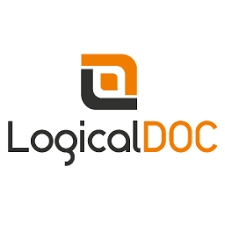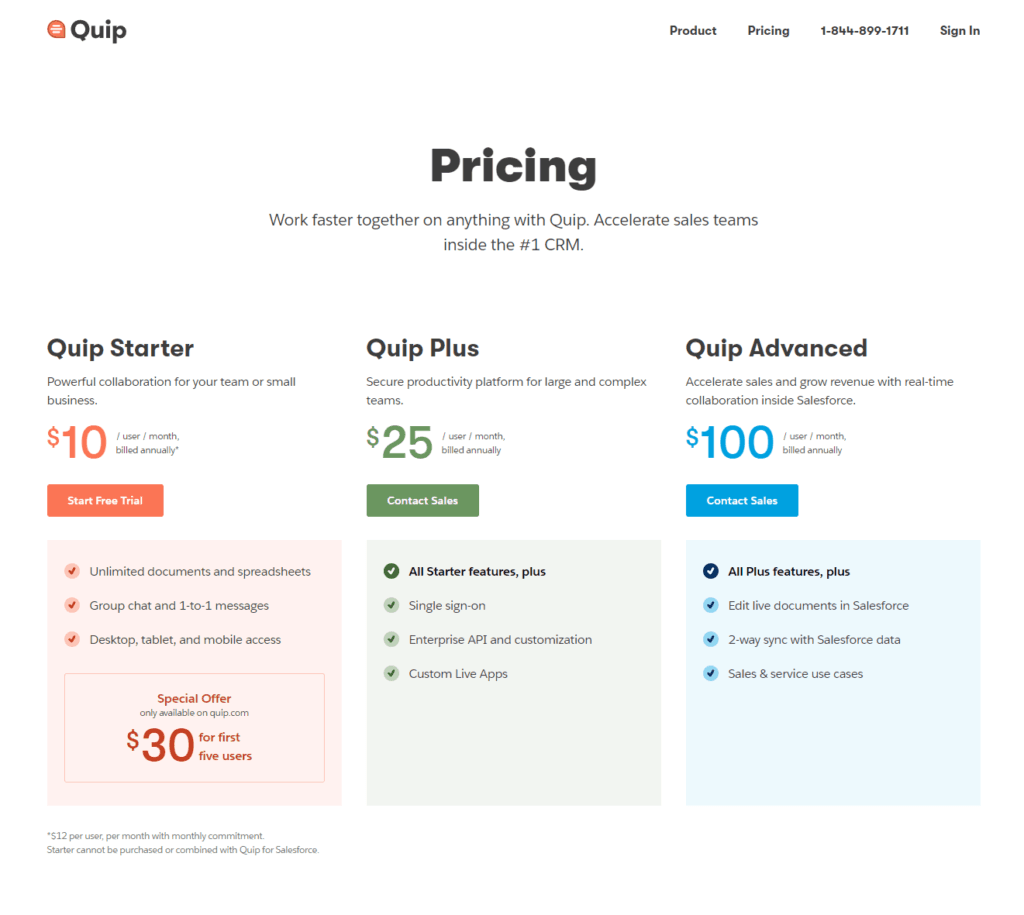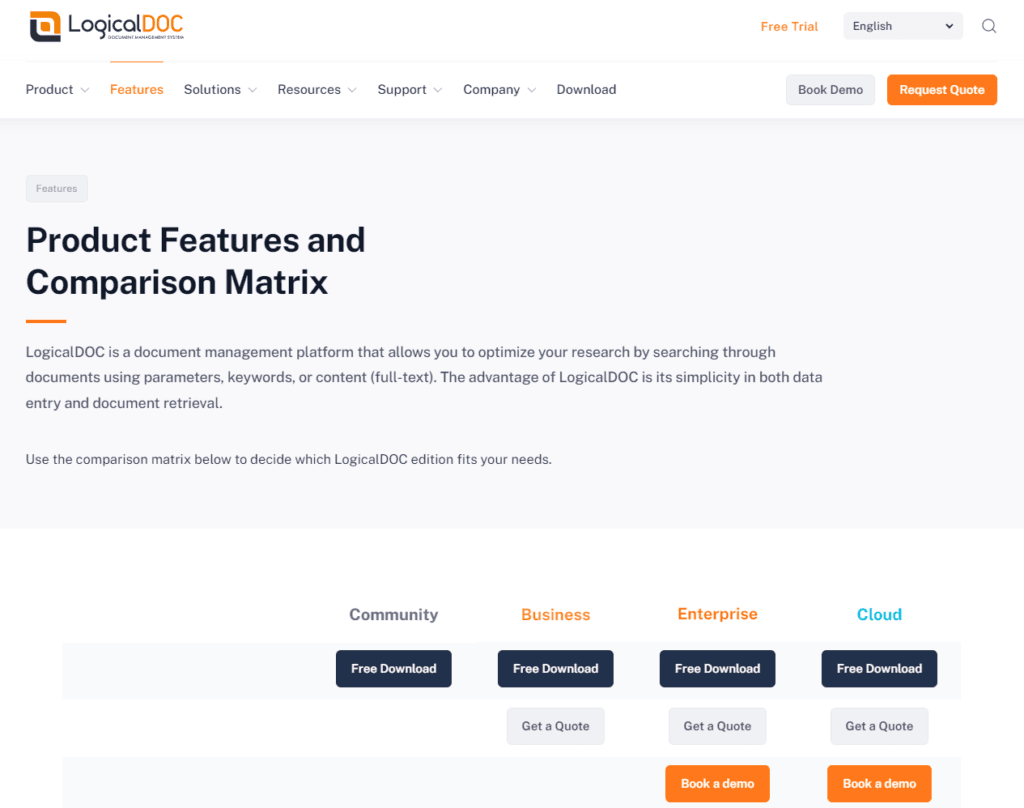In the quest for optimal office efficiency, choosing the right document management tool can make all the difference. Quip and LogicalDOC stand out as two formidable solutions in the digital landscape, each offering unique features and benefits. This comparison aims to delve into their functionalities, helping you decide which system might be the perfect fit for your business needs. Let’s start by comparing how each platform handles document creation and collaboration.
Quip | LogicalDOC |
|---|---|
| G2 Score – 4.2 out of 5 stars | G2 Score – 4.4 out of 5 star |
| TrustRadius Score – 7.6/10 | TrustRadius Score – 8.2/10 |
Document Creation and Collaboration
A core function of any document management system is facilitating the efficient creation and collaboration on documents. Here, we’ll explore how Quip and LogicalDOC each approach these crucial tasks.
Quip: Streamlined Collaboration and Integration
Quip excels in providing a seamless collaborative environment for document creation and management. Designed with teamwork in mind, it integrates documents, spreadsheets, and task lists directly into a chat-like interface. This integration allows team members to communicate and collaborate in real-time within the documents themselves, significantly enhancing productivity and reducing the need for back-and-forth emails.
One of Quip’s standout features is its real-time editing capabilities. Multiple users can work on a document simultaneously, with each person’s changes reflected instantly. This feature is supported by an excellent version control system that tracks all modifications, allowing users to revert to earlier versions if necessary. Additionally, Quip offers a sleek, user-friendly interface that makes navigating through features and documents effortless, even for newcomers.
LogicalDOC: Robust Document Management Across Industries
While Quip focuses on simplification and integration, LogicalDOC offers a more traditional document management solution with robust functionalities that cater to a wider range of industries. It excels in managing large volumes of documents with powerful indexing and search features, making it ideal for organizations that deal with complex document sets.
LogicalDOC supports comprehensive metadata tagging, advanced search capabilities, and automated workflows, which are essential for businesses requiring detailed document organization and management. The platform also facilitates collaboration, though it does so in a more conventional manner compared to Quip. Features include check-in/check-out systems, version control, and the ability to set access permissions at granular levels, ensuring that only authorized personnel can access sensitive information.
Integration Capabilities
The ability to integrate seamlessly with other business tools significantly enhances the functionality and efficiency of a document management system. Let’s examine the integration capabilities of Quip and LogicalDOC to see how they extend their utility across different business environments.
Quip: Seamless Integration with Salesforce and Beyond
Quip stands out for its deep integration with Salesforce, making it an exceptional choice for businesses that already utilize Salesforce for CRM and other business processes. This integration allows users to access and edit Quip documents directly within Salesforce, linking sales, service, or marketing workflows directly with document management. This seamless connection helps streamline processes and improves data consistency across platforms.
Besides Salesforce, Quip supports integration with popular tools such as Slack, which enhances team communication, and cloud storage providers like Dropbox and Google Drive, ensuring documents are accessible and synchronized across all platforms. These integrations are particularly valuable for teams that rely on a suite of apps to manage their business operations, as they can connect their document workflows directly with communication and storage solutions.
LogicalDOC: Extensive Compatibility Across Business Systems
LogicalDOC offers broad integration capabilities designed to work across various industries and IT environments. It provides a robust API that allows for custom integrations with ERP, CRM, and other enterprise systems. This flexibility makes LogicalDOC a versatile choice for organizations that require a document management system to integrate tightly with their existing software infrastructure.
LogicalDOC’s integration features are particularly beneficial for businesses that need to automate document-related processes. For instance, it can be integrated with accounting software to automate the storage and management of financial documents or with HR systems to manage employee records. This level of integration capability supports complex workflows and can significantly enhance operational efficiency by reducing manual tasks and improving data accuracy.

Related: Check out our free SEO suite

Security and Compliance
In the realm of document management, the security of sensitive information and adherence to compliance regulations are paramount. Let’s delve into how Quip and LogicalDOC each ensure the protection and integrity of your data.
Quip: Enhanced Security Within the Salesforce Ecosystem
Quip benefits greatly from being part of the Salesforce ecosystem, adopting its robust security frameworks. It utilizes advanced encryption methods to secure data both at rest and in transit, ensuring that all documents are protected from unauthorized access. Quip’s security measures are closely integrated with Salesforce’s overall security protocols, which are among the best in the industry, providing users with peace of mind regarding data safety.
In addition to technical safeguards, Quip also offers comprehensive compliance features, helping businesses meet various regulatory requirements such as GDPR, HIPAA, and others, depending on the nature of their data. This is particularly beneficial for organizations that operate in highly regulated industries or those that handle sensitive customer information.
LogicalDOC: Customizable Security for Diverse Requirements
LogicalDOC provides a robust security framework designed to cater to businesses across different sectors. It offers flexible security settings that can be customized to meet specific organizational needs. Features such as role-based access control, audit trails, and automatic document versioning help ensure that only authorized personnel can access certain documents and that all interactions with those documents are tracked.
LogicalDOC’s approach to compliance is equally adaptable, offering tools that can be tailored to support compliance with a wide range of international and industry-specific regulations. This adaptability makes it suitable for organizations that face complex compliance requirements or those that operate in multiple countries with varying legal standards.
Customer Support and Pricing
The level of customer support and the pricing model of a document management system can greatly influence your satisfaction and the overall cost-effectiveness of your investment. Let’s compare how Quip and LogicalDOC fare in these crucial aspects.
Quip: Integrated Support and Subscription-Based Pricing
Quip benefits from Salesforce’s established customer support network, offering comprehensive assistance through various channels, including dedicated support teams, online help resources, and community forums. The integration with Salesforce not only enhances the support capabilities but also ensures that users have access to a wide range of troubleshooting tools and user communities that can provide valuable insights and quick solutions.
Quip employs a subscription-based pricing model, which is straightforward and predictable, making it easy for businesses to budget for their document management needs. The pricing is generally based on the number of users and the level of functionalities required, with options to scale as your business grows. This model is particularly attractive for small to medium-sized businesses looking for a cost-effective solution that can scale with their growth.
LogicalDOC: Flexible Support Options and Scalable Pricing
LogicalDOC offers tailored customer support that can be adapted to the specific needs of different industries. Support options include direct assistance from the LogicalDOC team, extensive documentation, online tutorials, and user forums. This variety ensures that users can find the help they need in a manner that suits their preferences and requirements.
LogicalDOC provides a flexible pricing structure that can be customized based on the features and the scale of deployment. Both on-premises and cloud-hosted solutions are available, each with different pricing tiers to accommodate businesses of all sizes. This flexibility is beneficial for organizations that require a more customized document management solution or those with specific integration and security needs.
Scalability and System Updates
For businesses planning for growth, it’s crucial that their document management system not only meets current needs but can also scale effectively. Equally important is how the system handles updates and new features to stay relevant in a changing tech landscape. Let’s assess the scalability and update policies of Quip and LogicalDOC.
Quip: Seamless Scaling Within the Salesforce Ecosystem
Quip’s integration with Salesforce plays a pivotal role in its scalability. As part of a comprehensive ecosystem, Quip is designed to grow with your business, handling increasing demands without a hitch. The platform can easily accommodate an expanding number of users and seamlessly integrates with other Salesforce applications, which can multiply its functionality as your business processes become more complex.
Being under the Salesforce umbrella also ensures that Quip benefits from regular, automatic updates that keep all features up-to-date with the latest technological advancements and security measures. This approach minimizes the hassle for businesses, as updates are managed centrally by Salesforce, ensuring that Quip remains innovative and secure without requiring significant input from its users.
LogicalDOC: Customizable Scalability and Independent Updates
LogicalDOC offers high customizability which extends to its scalability. Whether you’re running an on-premises installation or a cloud-hosted solution, LogicalDOC can be scaled to fit increasing document loads and more complex organizational structures. This scalability is facilitated through modular licensing, which allows businesses to add features and functionalities as needed, making it ideal for businesses that anticipate variable growth or have fluctuating needs.
Unlike Quip, LogicalDOC’s updates are more dependent on the deployment model chosen by the organization. For cloud-hosted environments, updates are generally managed by LogicalDOC and rolled out automatically, ensuring users have the latest features and security updates. For on-premises installations, the management of updates rests more directly with the client, offering greater control but also requiring more involvement in the update process.
Pricing
Quip:

LogicalDOC:

Conclusion
Both systems offer robust functionalities but cater to different operational needs and environments.
Quip is highly integrated within the Salesforce ecosystem, making it an excellent choice for businesses already using Salesforce or those that value seamless integration with CRM and collaboration tools. Its strength lies in fostering real-time collaboration and communication, embedded within the document management process itself. Quip’s scalability within the Salesforce framework and automatic updates ensure that it remains cutting-edge and secure without requiring much administrative overhead. This makes it ideal for dynamic businesses looking to streamline operations and enhance team collaboration.
LogicalDOC, on the other hand, offers greater flexibility and customization. It’s well-suited for organizations that require a powerful, standalone document management system capable of handling complex document structures and large volumes of data. LogicalDOC’s strength lies in its ability to be tailored to specific business needs, whether deployed on-premises or hosted in the cloud. Its modular approach to scalability and the need for more hands-on management of updates make it suitable for businesses that require tight control over their document management system and those with variable growth or changing needs.
Read Next:
- GetResponse vs Zoho Campaigns: The Best Email Marketing Tool for 2024
- AWeber vs ActiveCampaign: The Best Email Marketing Tool
- Constant Contact vs Campaigner: Best Email Marketing Tool
- GetResponse vs Omnisend: The Best Email Marketing Tool for 2024
- AWeber vs Benchmark Email: The Best Email Marketing Tool






















Comments are closed.